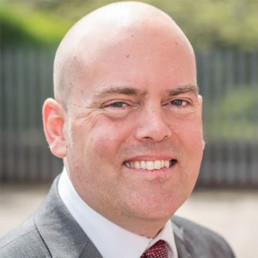
Written by Andrew Moffat
Andrew Moffat has been teaching for 25 years and is currently PD Lead at Excelsior MAT. He is the author of “No Outsiders in our school: Teaching the Equality Act in Primary Schools” and “No Outsiders: everyone different, everyone welcome”. In 2017 Andrew was awarded a MBE for services to equality and diversity in education and in 2019 he was listed as a top ten finalist in the Varkey Foundation Global Teacher Prize.
Ensuring equality for all cannot be achieved if any group of people feel they are unseen, unwelcome or feel targeted because of the person they are. As teachers, we strive to ensure that everyone feels seen, everyone feels welcome, and no one feels they have to hide their true selves, or parts of their identity.
In preparing children for life in modern Britain, we need to be clear and consistent in our efforts to make schools a safe place where children understand there are different ideas in society and prejudice may exist in the outside world, but prejudice and discrimination do not exist here, because in our school, there are “No Outsiders” and everyone is welcome.
Children are allowed to hold different views. I am a big champion of oracy as it encourages children to see both sides of a debate and understand it is possible to hold two views at one time. However, while different views are embraced, the othering of a group of people is not allowed. A child can disagree with a point of view and still show respect; this is the golden thread of a no outsiders ethos.
If a child chooses to use homophobic language, this must be tackled immediately. Children must understand there is no tolerance of prejudice at our school. It is the job of any adult to respond to homophobic language, as this is a safeguarding issue (KCSIE, 2023, “Children who are LGBT” page 51),
A quick response is; “Excuse me?” or, “What do you mean by that?” followed by, “And what do we say at our school?” to which the expected reply is “There are no outsiders”. Reiterate, “That’s right, there are no outsiders here, so you need to think about the language you are using. How are you going to put that right?”
All homophobic incidents should be recorded, and parents informed.
If homophobia arises in a debate where no individual is being targeted but there are attitudes forthcoming that need to be addressed, make sure they don’t go unchecked. An oracy framework enables us to challenge such attitudes effectively by asking the class to respond; “Would anyone like to respond to that?”. If the comment is offensive, for example if a child says, “gay people are wrong” it’s important that the adult responds immediately along the lines of;
“Can we think about the language we are using here… those ideas may exist in the outside world, but we need to be really careful about the words we use here. To say something is ‘wrong’ is different to saying, you ‘don’t agree’ with it. Do you want to re-phrase so that you are not othering anyone or being offensive?”
“What does the law say about this?” (The Equality Act, British law says it’s ok to be LGBT)
“What do we say at our school about different people?” (We say there are no outsiders, and everyone is welcome here.)
It’s vitally important the teacher addresses the attitudes while not giving their own opinion so we don’t get in to an argument or lead the children down any particular path. What we need to do instead is remind children it is ok to hold different views (“and that’s what makes this debate so interesting”) and we can still show respect and non-judgement. It’s ok to disagree with one another, the important thing is that everyone still feels they have a place here, including the child who is being offensive. It is the child’s views that are not welcome; the child is still welcome.
If a child brings their faith into the discussion; “My religion says it’s wrong”, respond in this way:
“You’re right, there are different views about this in different religions. And that’s the best thing about living in the UK- we have different views and beliefs, freedom of speech and democracy, and we have the Equality Act which protects religion and belief, so people are allowed to hold those views under British law. Who else is protected under the Equality Act? (disability, age, race, pregnancy and maternity, marriage and civil partnership, sex, LGBT) hmmm that’s interesting isn’t it – on the one hand you have religion and belief and on the other you have LGBT … both protected, both allowed… so I suppose we have to find a way to respect both views. We can co -exist without saying the other is wrong….”
And then open out the conversation, move it along using the oracy technique; “Who wants to build on that?”
Keep coming back to “That’s why we say there are no outsiders… we can have different opinions, and we can still respect each other. No one is pushed out because of their religion, their race, or because of their sexual orientation.”
I recognise that these conversations are not easy but they are important and we need to be having them with our children. My advice is to practice responses with each other as a staff team.
Here are some useful assembly links from www.no-outsiders.com:
https://no-outsiders-assembly.blogspot.com/2024/05/pride-2024.html
Assembly pictures : Football shirt (no-outsiders-assembly.blogspot.com)
Assembly pictures : football (no-outsiders-assembly.blogspot.com)
Assembly pictures : Bathroom (no-outsiders-assembly.blogspot.com)
Assembly pictures : Beano (no-outsiders-assembly.blogspot.com)
Assembly pictures : LGBT history month (no-outsiders-assembly.blogspot.com)
Assembly pictures : What is homophobia? (no-outsiders-assembly.blogspot.com)
Assembly pictures : Curly hair (no-outsiders-assembly.blogspot.com)
https://no-outsiders-assembly.blogspot.com/2024/06/veteran.html

